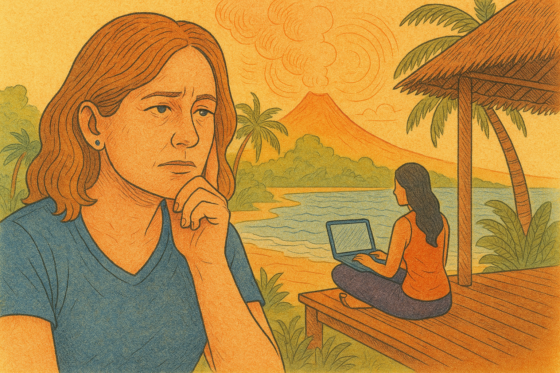A year ago, I was staring out the window of a high-rise office in downtown Singapore, sipping lukewarm coffee and wondering why I felt so numb despite doing everything “right.” Six figures? Check. Corner office? Check. Anxiety and existential dread by 3 p.m. daily? Also check.
So I did the thing that’s become a bit of a cliché—I quit. I booked a one-way ticket to Bali, packed my laptop and a few linen dresses, and set out to live the dream of remote work in paradise.
For six months, I lived in Canggu, bouncing between beachfront cafes and jungle co-working spaces. And yes, there were smoothies, sunrise yoga, and palm trees. But there were also moments of crushing loneliness, logistical nightmares, and the realization that “paradise” still comes with problems—just with a better view.
Here’s what no one tells you about the digital nomad dream:
1. You’re still working—just with worse Wi-Fi
Let’s get this one out of the way. Instagram would have you believe the digital nomad life is just hammocks and coconuts. In reality, you’re still working, often harder than before.
I was freelancing and managing remote gigs. That meant taking Zoom calls at 10 p.m. because clients were in New York, editing blog posts while dripping sweat in a fan-only café, and praying the Wi-Fi wouldn’t cut out during a file upload.
The fantasy? Typing on the beach with a cocktail.
The reality? Sand in your keyboard, glare on your screen, and mosquitoes the size of drones.
2. Community isn’t instant—and sometimes it feels transactional
I thought moving to Bali meant I’d instantly be surrounded by like-minded creative souls. And yes, there is a big expat and nomad community. But breaking into it isn’t always easy.
At first, I joined meetups, went to co-working events, and even signed up for a surf lesson where I mostly drank seawater and got ghosted by a Danish UX designer.
Many relationships felt fleeting. People were passing through. “Where are you from?” and “How long are you here?” became the default icebreakers, not “How are you, really?”
I eventually found my crew—some artists, a yoga teacher, a Canadian copywriter named Jules—but it took effort, patience, and vulnerability. And even then, I had to accept that every friendship had an expiration date.
3. Your problems don’t disappear, they just wear sarongs
Here’s something I didn’t expect: your internal baggage follows you across oceans.
I thought escaping my job, city, and routine would magically fix my burnout. It didn’t. I still carried the same perfectionism, imposter syndrome, and need for control. I just brought them to a villa with a pool.
Sure, the scenery helps. A lot. But unless you actively work on your mental health (hello, journaling, therapy apps, and 6 a.m. walks in rice fields), you’ll just recreate the same stress in a new timezone.
4. Visas, money, and logistics are not the sexy part
Oh, the paperwork. No one on TikTok warns you about the paperwork.
I had to navigate visa runs, bank transfers, international health insurance, and phone plans that randomly stopped working. I once spent a full day trying to top up my SIM card because the app kept crashing and the local kiosk only spoke Bahasa Indonesia.
There’s also the financial unpredictability. I went from a cushy paycheck to irregular freelance income. I had to learn how to budget in a currency I barely understood and sometimes made dumb mistakes—like withdrawing $500 from the ATM only to realize I’d been charged a $20 fee.
5. There’s beauty in boredom
There were days in Bali where nothing happened. I didn’t post. I didn’t explore. I just sat with myself. And that was the real transformation.
Being a digital nomad isn’t just about escapism or nonstop adventure. It’s also about slowness. Silence. Letting yourself be boring without guilt.
I learned to enjoy daily rituals: ordering the same iced kopi from the same warung, waving to the same security guard outside my co-living space, and watching geckos chase moths across the ceiling while I read paperbacks from the free shelf.
These were the moments that softened me. That grounded me.
6. Re-entry is a weird kind of culture shock
When I came back to the U.S., I felt like I’d aged 10 years in six months—but in a good way.
Reverse culture shock hit hard. The pace of city life, the pressure to hustle, the prices (don’t get me started on $14 salads)—it all felt surreal. I missed motorbike rides, barefoot cafes, and the sound of gamelan in the distance.
I also realized that I didn’t want to go back to corporate life. Ever.
7. You redefine success—on your own terms
Quitting my job didn’t make me rich. It didn’t make me famous. But it made me honest—with myself.
I learned that success isn’t just salary or status. It’s waking up and being excited for the day. It’s finding work that aligns with your values. It’s having the freedom to say yes—or no.
Now, I work as a full-time writer for Blog Herald. I earn less, but I live more. I’ve swapped my heels for sandals, my spreadsheets for stories, and my anxiety for a strange kind of calm.
Would I recommend the digital nomad life? Only if you’re ready for it to be real. Not perfect. Not effortless. But real.
Final Thoughts
Living in Bali didn’t solve all my problems. But it cracked something open in me. It reminded me that there’s more than one way to live. That comfort zones are often cages. And that sometimes, the bravest thing you can do is listen to the voice that says, “What if there’s something else?”
So if you’re standing at your office window, wondering if it’s worth the leap—know this: it won’t be easy. But it will be worth it.









